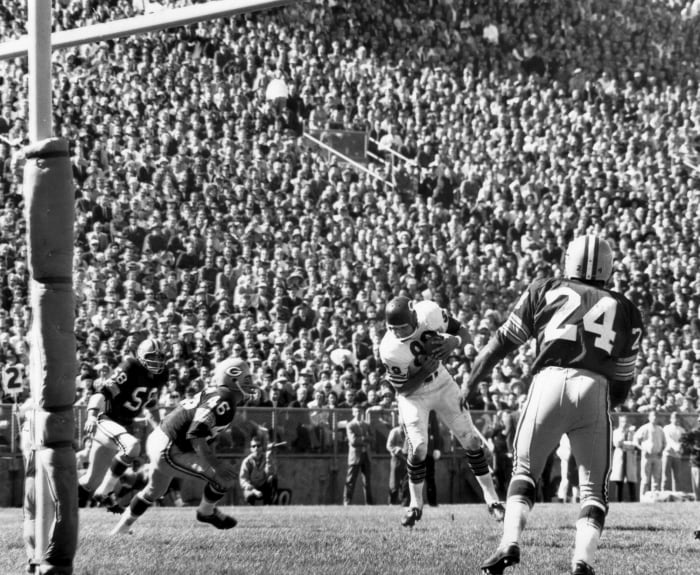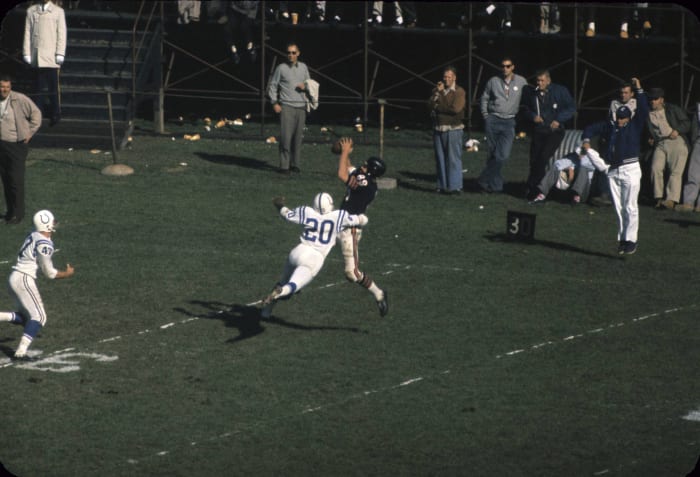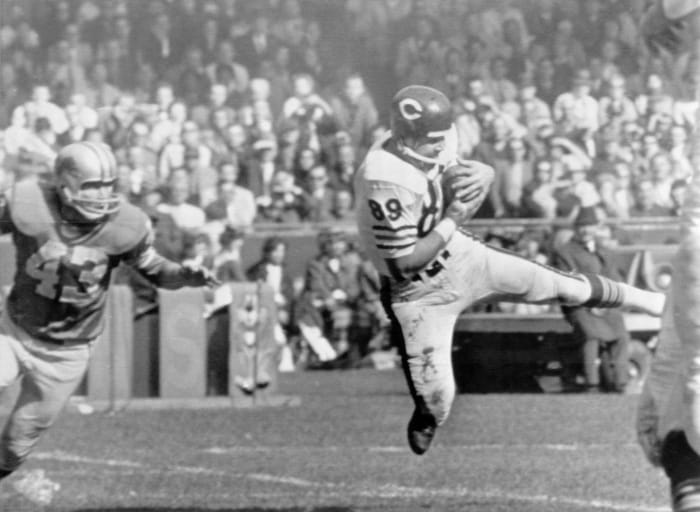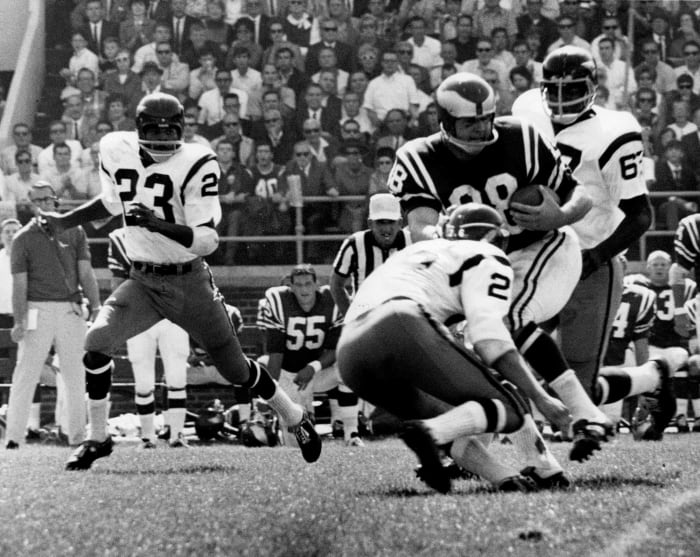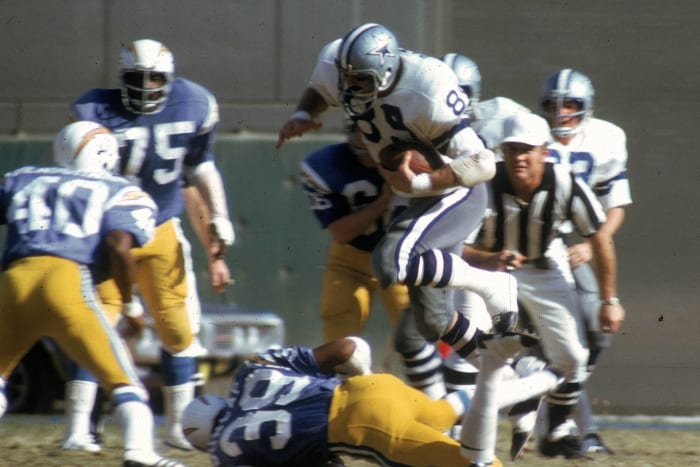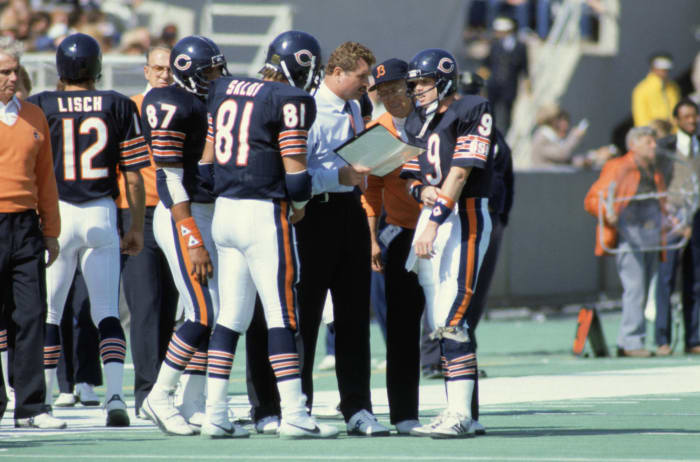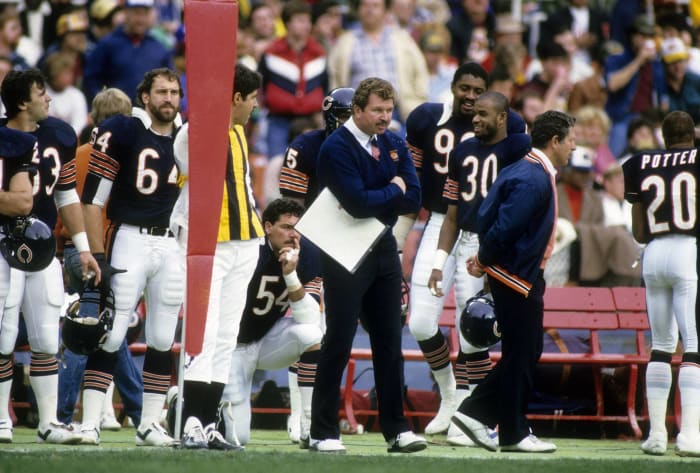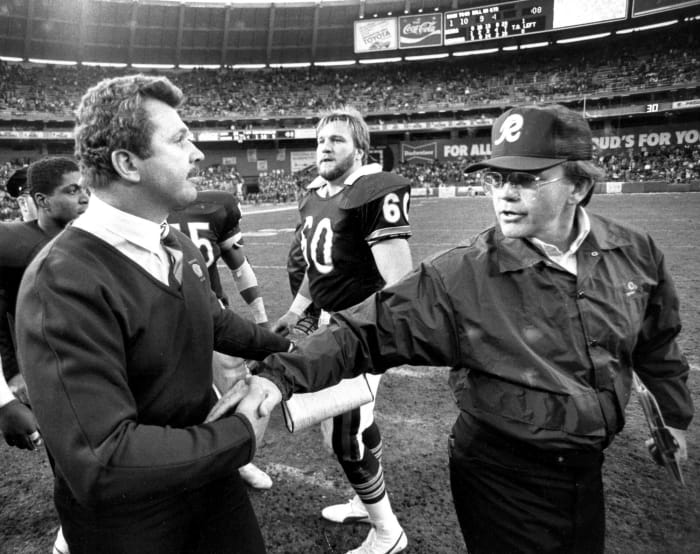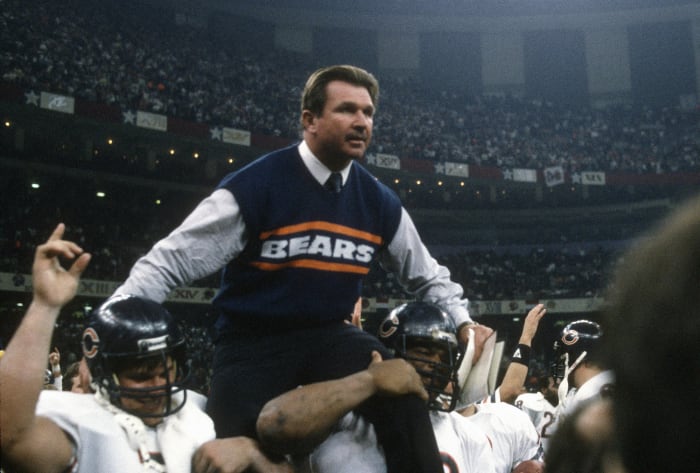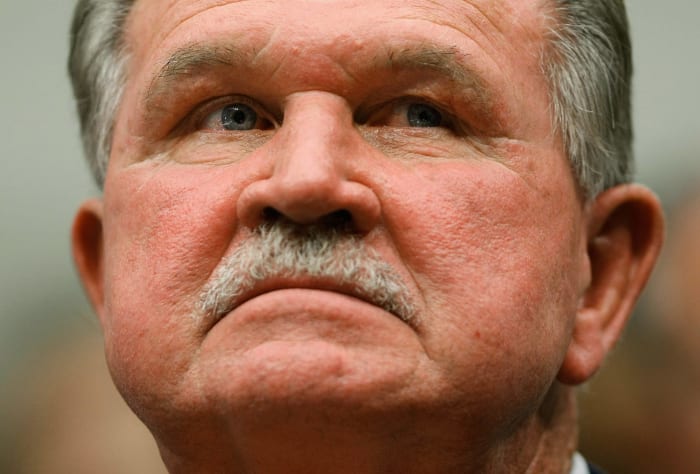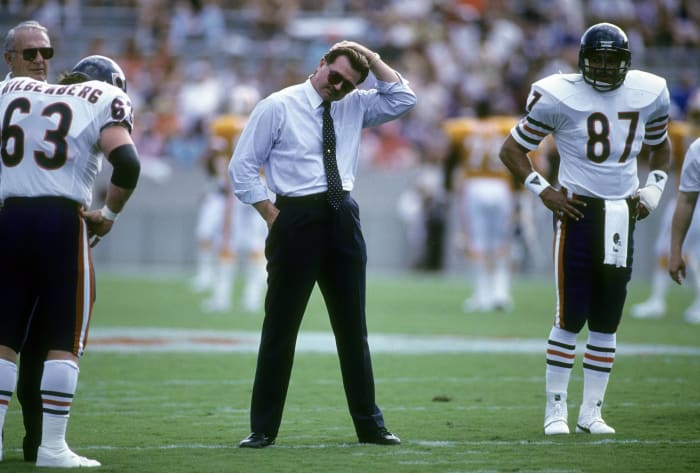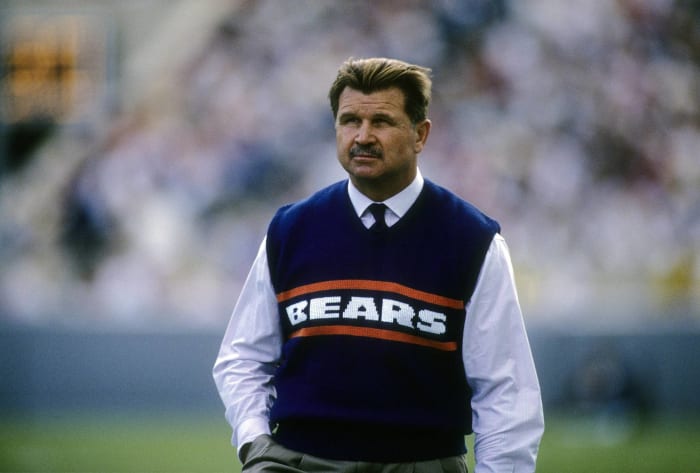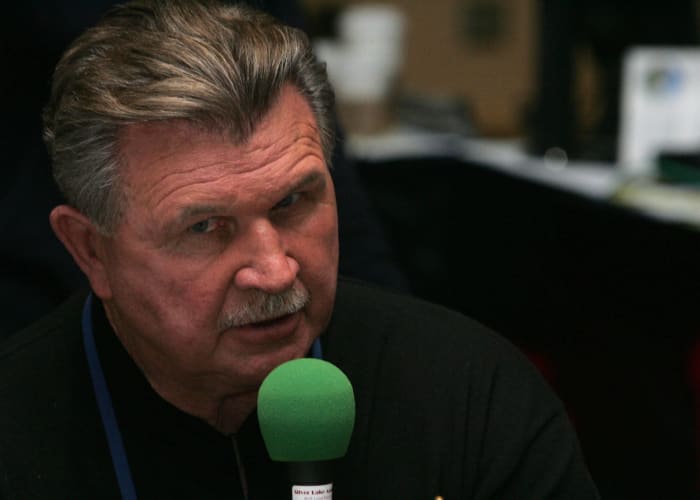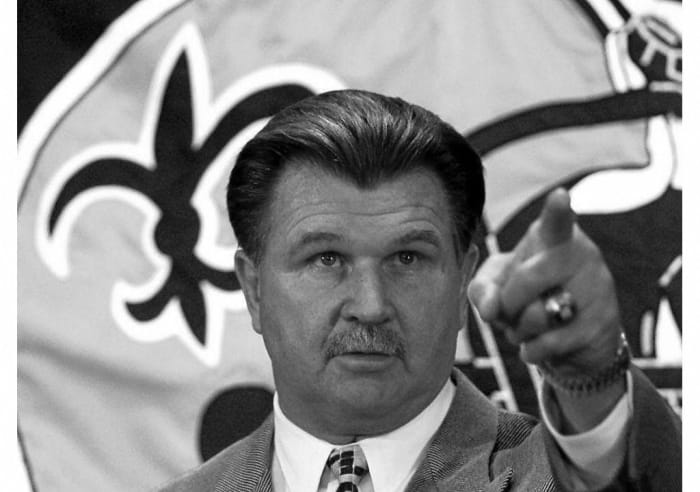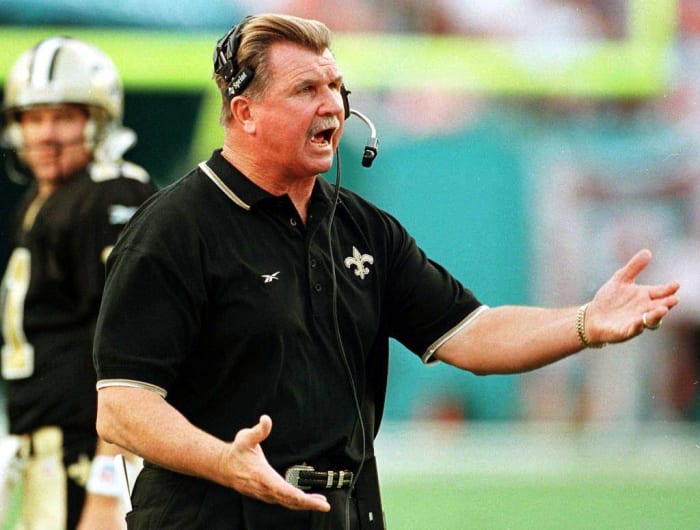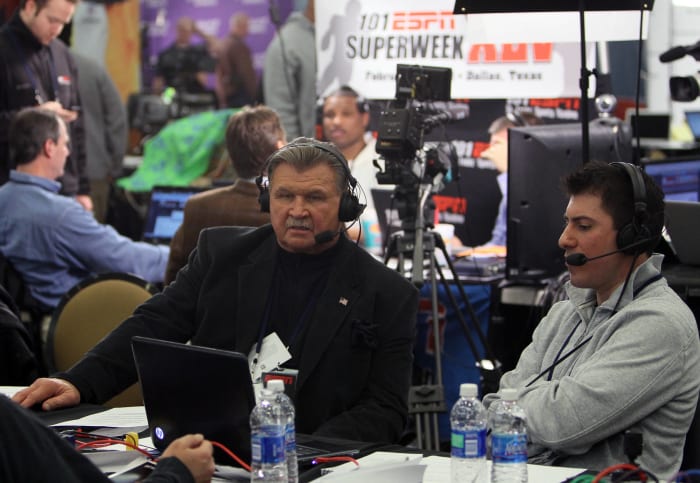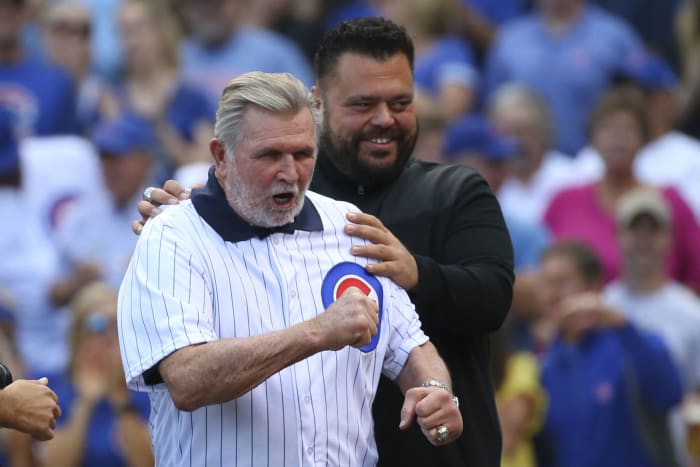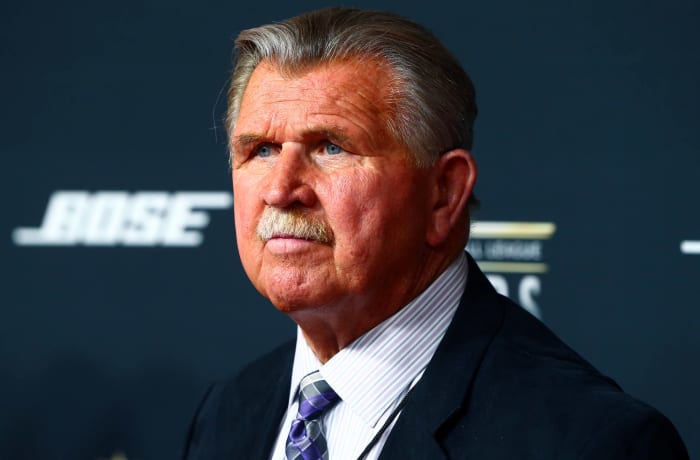Mike Ditka is one of the most beloved sports personalities that the city of Chicago has ever seen. He was not from Chicago but won a championship with the Bears as a player and guided them to their only Super Bowl title as a coach.
Here's a look at the life — on and off the football field — of the legendary Mike Ditka.
Bettmann/Contributor/Getty Images
Born Michael Dyczko on Oct. 18, 1939, in the town of Carnegie, Pennsylvania, near Pittsburgh, Ditka grew up in nearby Aliquippa where he was a three-sport high school star. Initially Ditka wanted to become a dentist, so he attended the University of Pittsburgh, thanks to a football scholarship. He reportedly was also recruited by Notre Dame and Penn State.
Fred Roe/Getty Images
While at Pitt from 1958-60, Ditka also played baseball and basketball. However, it was obvious he had what it took to make a serious living on the gridiron. In addition to becoming one of the top receiving tight ends in the nation during his collegiate tenure, the All-American also played on the Panthers defensive line and did some punting.
3 of 20
Off to the Windy City
Diamond Images/Getty Images
Following his stellar career at Pitt, Ditka was selected fifth overall by the Chicago Bears in the 1961 NFL Draft. He was also taken with the eighth overall pick by the Houston Oilers in the 1961 AFL Draft. Choosing to sign with Chicago, the crew-cut-haired tight end made an immediate impact, catching 56 passes with career highs of 1,076 yards and 12 touchdowns en route to becoming the NFL Rookie of the Year.
4 of 20
Born to be a Bear
Bettmann/CORBIS/Bettmann Archive/Getty Images
Ditka played six seasons with the Bears (1961-66). He helped the team win the 1963 NFL championship, was a five-time Pro Bowler and four-time, First-Team All-Pro. However, Ditka's relationship with legendary team owner/head coach George Halas was deteriorating prior to his final season, mostly due to the star tight end's contract status. Ditka famously said of Halas: ''He throws nickels around like they were manhole covers.'' His days as a player in Chicago were done.
Nate Fine/Getty Images
in 1967, Halas traded Ditka to the Philadelphia Eagles, where he spent two rather uneventful seasons. Then it was off to Dallas, where Ditka played four years, caught 30 passes in 1971 and a touchdown pass during the Cowboys' victory over Miami in Super Bowl VI — making him the only head coach in NFL history to also score a TD in the Super Bowl.
6 of 20
Closing one door to open another
James Flores/Getty Images
When Ditka retired after the 1972 season, he totaled 427 receptions for 5,812 yards with 43 touchdowns during his 12-year NFL career. However, he was not through with the NFL. Following his retirement, Ditka earned an assistant coaching gig on Tom Landry's staff in Dallas. He remained on the Cowboys staff as tight end and special teams coach and was part of the team's Super Bowl XII victory.
7 of 20
Once a Bear, always a Bear
James Flores/Getty Images
Despite the way Ditka left Chicago, the Bears had a special spot in his heart. He respected the tradition and felt he had some unfinished business with the organization. So in a rather bold move, Ditka sent Halas a letter basically saying he would like to return to the franchise as its head coach. The time was obviously right for a return, as the Bears toiled during a 6-10 1981 season, coach Neill Armstrong was fired and Halas decided to give Ditka another chance — in the role Ditka was meant to fill.
8 of 20
The road to greatness
Focus on Sport/Getty Images
Ditka was hired as the Bears head coach in January 1982, a move that was rather stunning because he was a serious under-the-radar selection. Though the team went 3-6 during his strike-shortened first season, Ditka was laying the groundwork for success through his players and own attitude. He would yell and scream but expected the very best from his team. If not, the players wouldn't be around long.
9 of 20
Return of the Monsters
Bill Smith/Getty Images
Focus on Sport/Getty Images
11 of 20
Call from the Hall
Win McNamee/Getty Images
12 of 20
Can't keep the man down
Focus on Sport/Getty Images
As it turned out, 1988 was quite the eventful year for Ditka. After being inducted into the Hall of Fame, he suffered a mild heart attack in November of the same year. In true "Iron Mike" fashion, he was back coaching less than two weeks later. The Bears went 12-4, beat Ryan and the Philadelphia Eagles in the infamous "Fog Bowl" and Ditka was named the NFL Coach of the Year for a second time.
13 of 20
Should have been better
Focus on Sport/Getty Images
It seemed Chicago would be set up for a dynasty, thanks to that caliber of a defense. However, a team as visible off the field as on might have gotten too caught up in its own success, including Ditka, who was all over television on non-game days. The Bears went 37-10 and won three more division titles from 1986-88 but made the NFC championship just once. Injuries, especially at quarterback, and player movement and retirements contributed to the Bears inability to return to their Super Bowl glory of 1985.
14 of 20
End of a coaching era - for now
Focus on Sport/Getty Images
After going 11-5 in both 1990 and '91, the Bears bottomed out with a 5-11 mark in 1992. In a move that was not surprising but still somewhat surreal and covered by Chicago media at the level of a dignitary's funeral, Ditka was fired following that season. He ended his coaching career with the Bears 106-62 — the second-most wins in team history behind Halas.
15 of 20
Time to do some talking
Cliff Welch/Icon Sportswire
After being dumped by the Bears, Ditka remained in the public eye. He worked as an NFL analyst and color commentator for television. It would be a job Ditka continued through his post-coaching career, a head-coaching run that did not end in Chicago. In 1997, Ditka was hired to coach the New Orleans Saints where the hits just kept coming.
16 of 20
Back in the saddle again
Don Emmert/AFP/Getty Images
Ditka went a dismal 15-33 during his three seasons coaching the Saints. But man, did he make headlines and keep the franchise in the news. In one of the strangest and most irrational moves in NFL history, Ditka traded all of New Orleans' 1999 draft picks, plus a first-round selection the next year, to Washington to move up and select Texas running back Ricky Williams with No. 1 overall choice. Who can forget the cover of ESPN The Magazine of the two, with Williams in a wedding dress.
17 of 20
Tough times in the Big Easy
RHONA WISE/AFP/Getty Images
The whole Williams' draft saga backfired on Ditka and the Saints. They went 3-13 in 1999, and Ditka was often curt and volatile toward the media. At one point following a loss during that season, Ditka said the team deserved better and that "he didn't have it anymore." As expected, Ditka was fired following the season. He would never coach again.
18 of 20
Man of all media
Jerome Davis/Icon Sportswire
As was the case after being let go by the Bears, Ditka again returned to TV as a studio analyst and branched out to radio as well. To this day, Ditka remains a popular figure both in Chicago and nationally, thanks to his outgoing personality, goofy antics and opinions on football — and any subject for that matter. He's also made several appearances in television and film.
19 of 20
Larger than life
Jerry Lai/USA TODAY Sports
When we think about prominent people associated with the city of Chicago, Ditka is up there with the likes of Walter Payton, Michael Jordan, Al Capone and the Blues Brothers. Love him, hate him (yes, there are those out there), Ditka is as iconic as they come, both as an NFL legend and public figure.
20 of 20
Embrace the excellence
Mark J. Rebilas/USA TODAY Sports
Those who have spent any sort of time in Chicago over the last 35 years know what Ditka means to that city, but he's obviously left a massive mark on the game of football. A member of both the Pro Football and College Football Halls of Fame, Ditka's No. 89 is retired by both the University of Pittsburgh and the Chicago Bears. Also, he and Tom Flores are the only coaches to win a Super Bowl as a player, assistant coach and head coach.

 +
+

